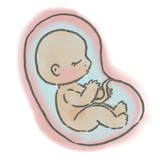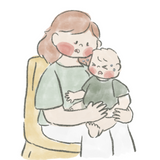Is Teething Ruining Your Baby's Sleep?
Teething is a significant milestone in your baby’s development, but it can bring challenges, particularly when it comes to sleep. Many parents find that their baby’s sleep patterns change during teething, leaving both baby and caregiver sleep-deprived. Understanding how teething affects sleep and knowing how to help your baby stay comfortable can make this phase more manageable.
How Teething Affects Sleep
Teething typically begins when babies are around 6 months old, but the exact timing can vary. Some babies may start teething as early as 3 months, while others might not show signs until after 12 months, which is normal. The first teeth to emerge are usually the lower central incisors (the bottom front teeth), followed by the upper central incisors (top front teeth). Most kids have all 20 of their primary teeth by their third birthday. If you're concerned about your baby's teething timeline, it's always best to consult with your paediatrician. As teeth push through the gums, your baby may experience discomfort, irritation, or even mild pain, which can disrupt their usual sleep patterns. Common signs of teething include:
-
Increased drooling
-
Chewing on objects
-
Swollen or tender gums
-
Fussiness or irritability
-
Changes in appetite
Teething pain tends to be more noticeable at night when distractions are fewer, and your baby is lying down, which increases pressure in the gums. This can lead to difficulty falling asleep or frequent night wakings.
Is It Teething or Something Else?
While teething can impact sleep, not all sleep disruptions are caused by teething. Factors like growth spurts, separation anxiety, or developmental milestones can also interfere with sleep. If your baby has a fever, diarrhoea, or is inconsolable, consult your paediatrician, as these symptoms are not typically caused by teething and may indicate illness.
Paediatric research shows that many parents and caregivers often attribute various physical illnesses to teething, even though these illnesses may not actually be caused by it. During the teething stage, infants experience a decline in passive immunity from maternal antibodies and greater exposure to common childhood illnesses, which could explain some of the symptoms mistakenly linked to teething. If your baby is experiencing severe symptoms, it’s important to consult your paediatrician to ensure a proper diagnosis and rule out any serious underlying conditions.
Tips to Help Your Baby Sleep During Teething
Soothe Sore Gums
Massage their gums: Gently rub your baby’s gums with a clean finger to ease discomfort.
Chilled teething toys: These can offer temporary relief by soothing and numbing sore gums. Always use toys specifically designed and safety-approved for teething, and avoid anything too hard or frozen to prevent gum damage.
Use a cold washcloth: Let your baby chew on a clean, chilled washcloth for comfort.
Maintain a Consistent Bedtime Routine
Even during teething, sticking to a predictable bedtime routine helps signal to your baby that it’s time to sleep. Include calming activities like a warm bath, gentle rocking, or reading a book to create a soothing environment.
Consider Pain Relief
If your baby seems particularly uncomfortable, consult your pediatrician about using over-the-counter pain relievers. Always follow dosage instructions and never give medication without medical advice.
Create a Comforting Sleep Environment
Ensure your baby’s sleep space is calm and conducive to rest. Dim lighting, soft lullabies, and a comfortable temperature can help your baby relax, even during teething discomfort.
Offer Extra Comfort
Teething can make babies feel clingy or irritable, so provide plenty of cuddles and reassurance. Holding or rocking your baby can help them feel secure and may ease their transition to sleep.
Be Patient with Sleep Regression
Teething can cause temporary sleep regressions, but these disruptions are usually short-lived. Once the tooth breaks through, your baby’s discomfort should subside, and their sleep patterns are likely to return to normal.
The Takeaway
Teething can be a challenging time for both babies and parents, but with the right strategies, you can ease the discomfort and support better sleep. Stay consistent, provide soothing relief, and offer extra comfort during this phase. Remember, teething is a natural part of your baby’s growth, and these sleepless nights will pass before you know it.


 Australian Dollar (AUD)
Australian Dollar (AUD)
 Hong Kong Dollar (HKD)
Hong Kong Dollar (HKD)
 Japanese Yen (JPY)
Japanese Yen (JPY)
 Singapore Dollar (SGD)
Singapore Dollar (SGD)
 South Korean Won (KRW)
South Korean Won (KRW)
 United Arab Emirates Dirham (AED)
United Arab Emirates Dirham (AED)
 Canadian Dollar (CAD)
Canadian Dollar (CAD)
 British Pound (GBP)
British Pound (GBP)
 Euro (EUR)
Euro (EUR)
 Swiss Franc (CHF)
Swiss Franc (CHF)
 Swedish krona (SEK)
Swedish krona (SEK)







